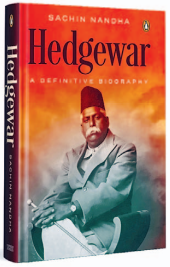A peek into Dr Hedgewar’s philosophy of cultural nationalism
| Date :06-Apr-2025 |

On the occasion of the 100th
anniversary of the Rashtriya
Swayamsevak Sangh (RSS), a
book on its founder, Dr Keshav
Baliram Hedgewar, is all set to
reveal hitherto unexplored aspects of his
life and political journey. Written by
Sachin Nandha, Hedgewar: A Definitive
Biography is the result of years of indepth research into Hedgewar’s role in the
inception of RSS and its fundamental
tenets. The book reveals to readers the
lesser-known anecdotes about his life,
including his childhood, ideology, and farreaching social and cultural impact.
Philosopher, strategist, and author
Sachin Nandha traces Hedgewar’s formative experiences as an orphaned child in
colonial India to becoming the architect of
one of the most strongest organisations in
the country’s history.
Nandha, a thought leader with a distinguished background in private equity,
spent over seven years researching the
book and says: “I have tried to examine
Hedgewar’s life and challenges with contemporaries like Gandhi, Nehru, and
Savarkar. I have also tried to explore his
inner struggles in reconciling his critique
of Hindu society,” adds Nandha.
Set against the backdrop of a country
grappling with colonial rule, rising communal tensions, and the complexities of
modernity, the book also offers insights
into his philosophy of cultural nationalism.
“
After spending almost seven years
researching and writing about a man who
remains largely unknown yet whose ideas
and work have impacted one-fifth of
humanity. Hedgewar's ideas are subtle yet
powerful,” says Sachin Nandha.
According to Nandha, the book is not
just a biography but also provides a
nuanced perspective on the RSS’s origins
and its impact on the country. He adds,
‘Hedgewar: A Definitive Biography is a
must-read for those seeking to understand
modern India’s complexities through the
life of a controversial yet extraordinary
man.”
What inspired you to write a biography on Keshav Baliram Hedgewar, and
what were some of the most surprising
discoveries you made during your
research?
Writing Hedgewar:
A Definitive
Biography was, in many ways, a journey
into the heart of India’s 20th-century history. Keshav Hedgewar is a figure who’s
ideas have shaped modern India in profound yet often overlooked ways. Despite
his foundational role in establishing the
Rashtriya Swayamsevak Sangh (RSS),
which has grown into one of the most
influential socio-political movements in
India, and arguably the world, he remains
a largely unknown figure outside the
Sangh’s immediate circles. My motivation
for writing this biography was to cut
through the layers of hagiography and
political polemics and present a rigorously
researched, nuanced portrait of the man—
his convictions, influences, struggles, and
the historical forces that shaped his ideas.
One of the biggest surprises during my
research was discovering his deep
engagement with Western political
thought. While Hedgewar is often viewed
solely through the prism of Hindu nationalism, his readings and influences were
much broader. His understanding of leadership, organisation, and institutional continuity owed as much to modern European
thinkers and movements as it did to traditional Indian frameworks.
Unlike many
political leaders of his time who sought
immediate independence, Hedgewar
began playing a longer game—one that
was about shaping the very fabric of
Indian society rather than merely securing
political power. The very fact that
Hedgewar consciously chose to distance
himself and the early RSS from politics
clearly demonstrates his distaste for political nationalism – the kind that the
Congress was pursuing at the time, compared to Cultural nationalism – the type
that build nationalists communities, and
were either rooted in, or interested in
creating, India’s civilisational ethos.
Hedgewar remains a complex and
often debated figure in Indian history.
How does your book present a
balanced perspective on his life and
ideology?
Hedgewar’s legacy is deeply intertwined with the trajectory of modern
India, yet discussions about him are often
polarised—either portraying him as a
near-mythic visionary or as a controversial figure viewed through ideological
lenses. My approach in Hedgewar: A
Definitive Biography was to move beyond
both hero worship and criticism, offering a
rigorous, fact-based exploration of his life,
decisions, and ideological evolution.
To achieve this, the book relies on a
wide range of sources—archival documents, Hedgewar’s personal correspondences, first-hand accounts from those
who knew him, and contemporary historical analyses.
I wanted to present
Hedgewar in his full complexity: as a revolutionary nationalist in his youth, an
organisational strategist in his later years,
and a man who sought to reshape India’s
social fabric through long-term institutional change. His strengths—unwavering
commitment, strategic foresight, and ability to inspire loyalty to a cause—are examined alongside his limitations, including
the rigid ideological framework he helped
construct and the contentious debates it
sparked.
Ultimately, this biography presents a
nuanced portrait that allows readers to
form their own judgments. Whether one
admires him or disagrees with his ideas,
understanding Hedgewar is crucial to
understanding India’s socio-political evolution. My hope is that this book fosters a
more informed and thoughtful conversation about his role in shaping the nation.
You’ve compared Hedgewar’s challenges with those faced by contemporaries like Gandhi, Nehru, and
Savarkar. What were the key ideological or strategic differences that shaped
his vision?
Gandhi vs. Hedgewar – Mass
Mobilisation vs.
Institution-Building
Gandhi and Hedgewar both recognised
the power of grassroots mobilisation, but
their methods were fundamentally different. Gandhi believed in broad-based,
mass movements centred around moral
and spiritual awakening—nonviolent
resistance, satyagraha, and the idea of
India as a composite nation with pluralistic traditions. Hedgewar, on the other
hand, was sceptical of mass movements
that were reactive rather than structured.
He saw politics as transient but culture as
enduring. While Gandhi focused on immediate political liberation, Hedgewar envisioned a long-term, disciplined transformation of Hindu society, which he felt had
been weakened over centuries due to a
corrosion of what we might call Social
Capital in modern times.
Nehru vs. Hedgewar – Political
Nationalism vs. Cultural Nationalism
Jawaharlal Nehru’s vision was largely
shaped by Russian socialism, combined
with a modernist anti-imperial British scientific ideal. He viewed Indian nationalism through a secular, state-driven lens,
advocating for a strong central government, industrialisation, and what he
deemed as ‘progressive reforms’.
Hedgewar, by contrast, saw nationalism
as rooted in civilisational identity rather
than the modernist idea of the nationstate. He believed that India’s survival
depended on a type of cultural renaissance rather than state institutions alone.
In other words, for Nehru the State was
real, and culture largely imagined.
Whereas, for Hedgewar the State was
imagined, and culture was real. This ideological difference—whether India’s unity
should be built through the State or
through cultural cohesion—remains a key
point of debate in Indian political thought
even today.
Savarkar vs. Hedgewar – Political
Hinduism vs. Societal Rejuvenation
Despite both advocating India as essentially a Hindu nation, Hedgewar and
Savarkar had distinct strategies. Savarkar
was a political nationalist, a fiery orator
who framed Hindutva as a political doctrine, arguing that Hindus should claim
India as their exclusive nation. Hedgewar,
in contrast, was more focused on building
institutions that could shape Hindu society
from within. He was less concerned with
immediate political power and more with
creating long-term social capital that
could influence Indian society across generations. Unlike Savarkar, who was an
atheist and rationalist, Hedgewar
remained connected to Hindu traditions
and saw their revitalisation as essential to
India’s resurgence.
Your book explores Hedgewar’s philosophy of cultural nationalism. How do
you see its relevance in today’s India,
especially in the context of the RSS’s
evolving role?
Hedgewar’s philosophy of cultural
nationalism was rooted in the belief that
India’s strength lay in its civilisational
continuity rather than in transient political
movements – aka State power.
He saw
national identity as something deeper
than territorial boundaries—it was a cultural and historical consciousness under
pinned by social capital, that had been
eroded under centuries of Imperialism and
Colonialism. His vision was not just about
independence from the British but about
revitalising what he saw as the core ethos
of Indian civilisation.
Today, as India navigates its position as
a rising global power, the relevance of
Hedgewar’s ideas can be seen in the continuing debate over national identity, pluralism, and the role of culture in governance – India is still grappling with the
idea of a civilisational state.
Hedgewar himself was deeply strategic
in how he framed the RSS—not as a political entity but as a long-term social movement. He was wary of direct political
entanglement, believing that cultural
change was more enduring than capturing
state power.
Ultimately, Hedgewar’s relevance today
lies in the ongoing national conversation
about identity, governance, and India’s
place in the world. The book does not
take a position on whether cultural
nationalism is the ideal path forward but
instead provides historical context for
understanding how these ideas developed, how they have evolved, and how
they continue to shape the India of today.
Whether one agrees with his vision or not,
Hedgewar’s impact on India’s trajectory is
undeniable.
Beyond the political and ideological
aspects, what personal struggles or
defining moments in Hedgewar's life do
you think shaped him the most?
Keshav Hedgewar’s life was marked by
tragedy, quiet resilience, and a relentless
commitment to his vision.
Perhaps the most defining moment of
his life was his decision in 1925 to establish the Rashtriya Swayamsevak Sangh
(RSS). This was a radical departure from
the political activism of his time. Unlike
Congress leaders who were seeking
immediate political gains or revolutionaries engaging in violent resistance,
Hedgewar took the long view—he wanted
to create a movement that would 1)
rebuild the character and skills of the
individual; 2) build communities (what we
call social capital today), and 3) transcend
caste, creed and class through ‘service’ for
ones fellow citizens; and essentially
thereby rejecting divisions.
Ultimately, Hedgewar’s defining
moments were not just about resistance
against colonial rule but about his
realisation that political independence, by
itself, was not enough. His struggles
forged a leader who was not just a strategist but a man of deep conviction, willing
to dedicate his life to an idea that he
knew would outlive him. ■

